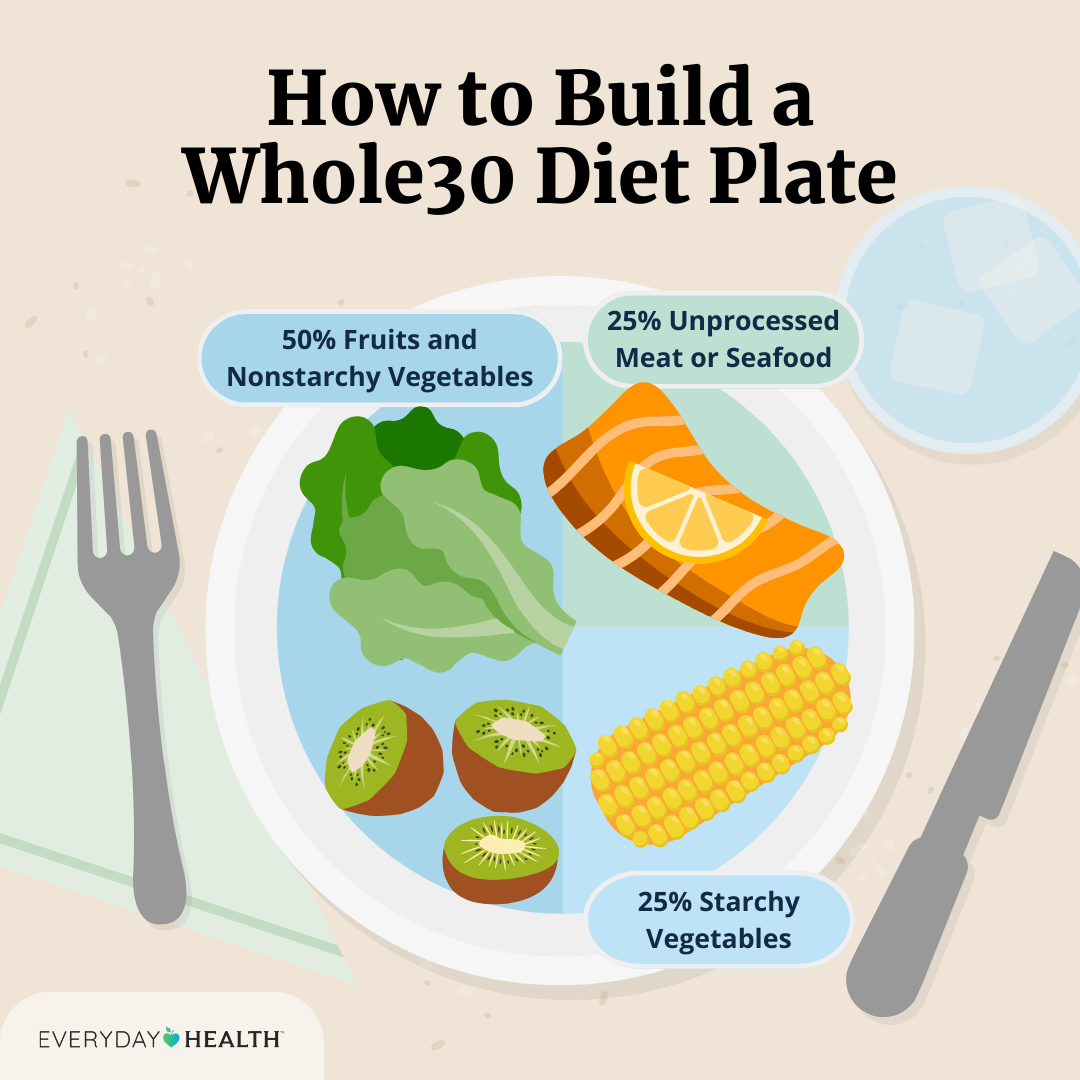In the world of diet trends, the Whole30 program has earned a reputation for being a strict, transformative, and often polarizing eating regimen. Promoted as a “reset” for your body, Whole30 encourages participants to eliminate certain food groups for 30 days in order to improve health, energy levels, and overall well-being. But with so many diets claiming to promote rapid weight loss or improve health, it begs the question: Is Whole30 truly effective, or is it just another overhyped fad? This article takes an in-depth look at the Whole30 program, its benefits, potential drawbacks, and whether it delivers on its promises.
What is the Whole30 Diet?
The Whole30 diet was created in 2009 by Melissa and Dallas Hartwig, health and fitness experts who sought to develop a program that would help people identify food sensitivities and improve their relationship with food. The program is designed to be followed for 30 days, during which participants eliminate a list of food groups that are commonly associated with inflammation, digestive issues, and cravings.
The core principle of Whole30 is to eat “whole” and unprocessed foods, such as:
- Meat (grass-fed, free-range, etc.)
- Fish and seafood
- Eggs
- Vegetables
- Fruits
- Nuts and seeds
- Healthy oils (olive, coconut, avocado, etc.)
During the 30 days, participants are strictly prohibited from consuming:
- Sugar (both natural and artificial, including honey, maple syrup, and agave)
- Alcohol
- Grains (wheat, rice, oats, barley, quinoa, etc.)
- Legumes (beans, lentils, chickpeas, peas, soy products)
- Dairy (cow, goat, or sheep milk products, including cheese and yogurt)
- Processed foods and additives (including artificial sweeteners, MSG, and sulfites)
- Baked goods, junk food, or treats (even if they are “Whole30-compliant”)
The idea behind the program is that by eliminating these foods, participants can reset their body’s relationship with food, identify any food sensitivities or intolerances, and improve overall health. After the 30-day period, participants gradually reintroduce the eliminated food groups to observe how their body responds.
What Are the Claims of the Whole30 Diet?
The Whole30 program is marketed as a way to:
- Identify Food Sensitivities – By cutting out common allergens and irritants, participants can pinpoint which foods might be causing bloating, fatigue, skin issues, headaches, or digestive distress.
- Improve Digestion – The diet eliminates foods that are often problematic for the digestive system, such as grains, dairy, and legumes, and promotes nutrient-dense, anti-inflammatory foods.
- Boost Energy – By cutting out refined sugars and processed foods, Whole30 claims to help people stabilize their blood sugar levels, which may lead to more sustained energy throughout the day.
- Regulate Hormones – The program’s emphasis on nutrient-dense, whole foods is said to support hormone balance, particularly insulin and cortisol.
- Promote Weight Loss – While not marketed as a weight-loss diet, many participants report losing weight as a result of cutting out calorie-dense, processed foods and improving overall eating habits.
- Improve Mental Clarity – Whole30 encourages the elimination of processed and sugary foods that can cause mood swings or brain fog, promoting clearer thinking and emotional stability.
Does the Whole30 Diet Really Work?
1. Potential Benefits of Whole30
- Weight Loss: Many participants report weight loss after completing the 30-day program. This is likely due to the elimination of processed foods, sugars, alcohol, and high-calorie snacks. By focusing on whole, nutrient-dense foods, the diet tends to reduce overall caloric intake without requiring participants to count calories.
- Improved Digestion: Since Whole30 cuts out many common irritants like dairy, gluten, and legumes, it can help improve digestive symptoms such as bloating, gas, and discomfort. People with food sensitivities may notice a marked improvement in how they feel, especially if they discover which foods are triggering their symptoms.
- Increased Energy Levels: Eliminating sugar and processed foods helps stabilize blood sugar levels, which can lead to more consistent energy throughout the day. Without the highs and crashes associated with sugary snacks or processed carbs, many people report feeling more energized and less reliant on caffeine.
- Better Skin: Some Whole30 participants experience clearer skin after eliminating dairy and processed foods, which are known to contribute to acne and other skin conditions in certain individuals.
- Improved Relationship with Food: The 30-day reset is designed to help individuals break free from unhealthy food patterns and emotional eating habits. By focusing on real, nourishing foods, participants often develop a greater appreciation for how food affects their body and well-being.
2. Potential Drawbacks and Challenges
- Restrictiveness and Social Pressure: One of the biggest challenges of Whole30 is its highly restrictive nature. Eliminating entire food groups, including beloved comfort foods and alcohol, can be socially isolating and mentally taxing. Dining out, social gatherings, and family meals can all become challenging, and the strict rules may lead to feelings of deprivation.
- Nutrient Deficiencies: Although Whole30 promotes nutrient-dense foods, it does eliminate food groups that provide important vitamins and minerals. For example, cutting out dairy may lead to lower calcium intake, and eliminating legumes removes a significant source of plant-based protein and fiber. To prevent nutritional imbalances, it’s important to carefully plan meals and possibly supplement with vitamins or minerals where necessary.
- Short-Term Approach: The Whole30 program is designed to last for 30 days, which means it’s not a long-term, sustainable eating plan for everyone. After the 30-day period, participants may revert to old eating habits, and any benefits from the diet might be short-lived if healthy practices aren’t continued.
- Lack of Scientific Evidence: While Whole30 claims to improve various aspects of health, there is limited scientific research directly supporting the program. Much of the evidence is anecdotal, based on personal testimonials rather than clinical studies. While eliminating processed foods and sugar is generally beneficial, more research is needed to prove the specific claims made by the program.
Is Whole30 Right for You?
Whole30 can be effective for individuals looking to reset their diet, identify food sensitivities, or lose weight. However, it is a highly restrictive program that may not be suitable for everyone. If you have a history of disordered eating, struggle with food anxiety, or prefer a less rigid approach to nutrition, Whole30 may not be the best fit for you. Additionally, its focus on elimination can make the diet difficult to sustain long-term.
Before starting Whole30 or any restrictive diet, it’s essential to consider your health goals, lifestyle, and potential challenges. If you’re simply looking to eat more whole, unprocessed foods and reduce sugar intake, there may be more sustainable, less rigid approaches that better align with your needs.
Conclusion: Is Whole30 Worth the Hype?
Whole30 has certainly made a splash in the world of diet trends, and for good reason. It offers a structured and clear approach to eliminating processed foods, which can lead to improvements in digestion, energy, and overall well-being. However, its highly restrictive nature, lack of long-term scientific evidence, and potential for nutrient deficiencies make it unsuitable for some individuals.
If you’re interested in trying Whole30, it’s important to carefully plan your meals, ensure you’re getting all the necessary nutrients, and be prepared for a challenging but potentially rewarding 30-day period. Ultimately, the success of Whole30 hinges on whether it aligns with your personal health goals and your ability to maintain healthier habits beyond the 30 days.































